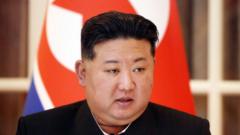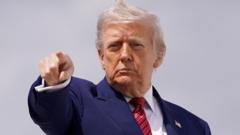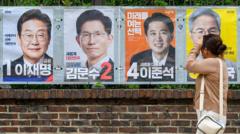With key issues like national security, economic management, and ongoing tensions with North Korea and China on the agenda, the next president will face an uphill battle.
**South Korea Prepares for Critical Snap Presidential Election Amid Political Turmoil**

**South Korea Prepares for Critical Snap Presidential Election Amid Political Turmoil**
As South Korea gears up for a pivotal presidential election on June 3, the nation seeks stability following the controversial removal of President Yoon Suk Yeol.
On June 3, South Korea will hold an urgent presidential election to replace Yoon Suk Yeol, who was ousted from office due to his attempt to impose martial law for six hours last December. This dramatic political event has left the country in a state of upheaval, necessitating a government overhaul and pointing to a deep divide among citizens regarding Yoon's controversial actions.
Yoon, initially set to serve until 2027, was impeached by parliament for his martial law declaration, justified by claims of threats from "anti-state forces" and North Korea. A constitutional court upheld his impeachment on April 4, necessitating the snap election under South Korean law. In the interim, the country has been led by three acting presidents, with the latest being Lee Ju-ho, the labor minister appointed a month before the voting.
The buildup to this election comes at a time when South Korea is reeling from political divisions intensified by mass protests against Yoon's martial law. Alongside domestic discontent, the nation's economic outlook has been shaken, particularly amidst trade tensions with the US, where tariffs on South Korean exports pose further challenges. As North Korea remains a persistent threat, the new leader will also have to navigate complex ties with both Beijing and Washington.
Polls indicate that the main opposition candidate, Lee Jae-myung of the Democratic Party, is leading, followed closely by Kim Moon-soo from the ruling People Power Party (PPP). Lee, who narrowly lost the 2022 election to Yoon, is viewed by supporters as a champion of the working class, advocating for job creation and social equity. In contrast, Kim, formerly a labor minister, aims to cultivate a business-friendly economic landscape.
Voters can cast their ballots on June 3 from 06:00 local time until 20:00, with early voting for South Koreans abroad having occurred from May 20 to May 25. Results will likely emerge shortly after polls close, with anticipation building around who will assume the presidency following a historical contest in which Yoon won by a mere 0.73% in 2022.
Meanwhile, Yoon, now facing legal challenges including insurrection and abuse of power charges, has resigned from his party to potentially bolster Kim's chances in this election. As South Korea embarks on this critical electoral journey, the nation watches closely, aware that the coming leadership will have profound implications for its future.





















